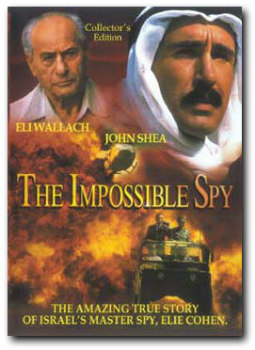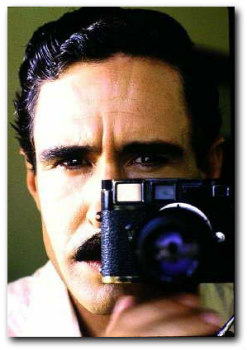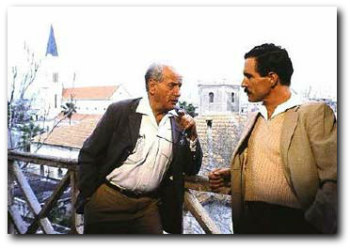
HOMEWesley Britton’s Books,
|
Spies on FilmSpies on Television & RadioSpies in History & LiteratureThe James Bond Files |
|
Spies in History & Literature ~ The Story of Israel’s
Most Famous Secret Agent – Behind the Scenes of The
Impossible Spy
By Wesley Britton 
The Impossible Spy is available on DVD. The Impossible Spy was chosen for the museum’s “Spies on Screen” series because it chronicles the true story of Eliahu ben Shaul Cohen, an important spy under the proverbial umbrellas of Israel’s intelligence agency, the Mossad. During the early 1960’s, Cohen had provided Israel with valuable information on Syrian military activities and their fortifications on the Golan Heights. At the time of his arrest in 1965, Cohen had become so popular among the Syrian leadership that he was being considered for the post of Deputy Defense Minister, third in line for the Presidency. Although this umbrella Israel offered was large and had its influences, it did not keep Cohen out of the rain. As he would later be captured and have a fateful encounter with the Syrian Government. According to the Friends of Elie Cohen Memorial, “on May 18, 1965, the Government of Syria executed Elie Cohen despite protests from world leaders and Israel. He was never allowed a defense at his trial, he was brutally tortured during interrogation in defiance of international humanitarian law, and his body was never returned to his family.” In the words of Amanda Ohlke, Manager of Adult Education for the International Spy Museum, “The Impossible Spy captures the story of this unlikely spy – from his hesitant response to recruitment to his enthusiastic adjustment to life as a Syrian powerbroker.” The 18th Anniversary DVD version has just been released by Janson Media to commemorate the 40th anniversary of the June 5-11, 1967, Six-Day War between Syria and Israel, a war won in large part because of Elie Cohen. The new DVD release includes material not available on a previous issue, so those intrigued by this significant tale of spycraft can now see the award-winning film with all the bells-and-whistles of modern DVD releases. How this story came to the screen is a fascinating look into the dedication of many participants, so – drawing from Harvey Chertok’s museum remarks and a March 2, 2006, phone interview – here’s the full story behind The Impossible Spy Beginnings First, what makes The Impossible Spy significant? In Harvey Chertok’s words, “The enormously successful Bond films are wonderful, entertaining fantasies – but The Impossible Spy is quite different – because it is based upon a true story. Also, as many of you know, much of the current debate about Stephen Spielberg’s Munich revolves about its opening on-screen legend – ‘Inspired By True Events.’ I am no Stephen Spielberg – far from it. However, both of our movies were based upon true stories. But neither Munich nor The Impossible Spy are documentaries – rather they are what are now called ‘docudramas’ – in that events are re-created with actors – and with scripts that are based on as many facts as possible.” According to Chertok, the inspiration began when his wife, Bobbi, accompanied him on a business trip to Israel and the couple happened to have a few days off. On August 19, 1982, at the Hotel Nof, which means “View” in Hebrew, the assistant manager took them to the roof to show how close Jordon, Lebanon, and Syria were to Israel. “You read about it, you hear about it,” Harvey said, “but when you actually see it, it’s incredible how close these countries are. The manager pointed to the Jordanian border and drew his finger from that border to the base of the hotel and said it’s only eight miles from there to here. On that day, the last boat taking the remaining group of the PLO and Yassar Arafat out of Beirut was leaving, but there was still scattered military activity going on. My immediate reaction was obvious to the manager, that I was concerned by the closeness. He said, ‘Well, you really have nothing to worry about. We have spies in all these places. Most of the time, we know what they’re going to do before they know what they’re doing.” Then the manager told Chertok if he wanted to read about these spies, the best was Elie Cohen and there’s a book about him. Chertok picked up a copy of Our Man in Damascus by Eli Ben-Hanan, and “I not only became fascinated but just became obsessed with the idea of making a movie about Elie Cohen. From that day, August 19, 1982, it took exactly – to the day – five years when I happily delivered the completed print to HBO.” Ironically, Chertok tried to get the rights to the book that started him on his quest, “but we were unsuccessful with the author.” 
John Shea as Elie Cohen, the Impossible Spy. Chertok found a young man named Marty Ross to write the script, a student recommended by a teacher who thought highly of Ross’s class work in New York. “I worked with him over eleven drafts until we got it to a point where we all felt that it was good as we could possibly make it and took it to the BBC.” Research was an interesting aspect of the process. “We tried to get facts via The Freedom of Information Act – on the assumption that because of the U.S.-Israel security information exchange, there would be a file in Washington about the spy, Elie Cohen. And, he was not just another spy – he was Israel’s best. Indeed – there is a CIA file on Elie Cohen! But after about 6 months of trying to get it, we were told by the CIA, ‘Yes, we certainly were entitled to receive the file – but we have a small department – and there is only one researcher, and he is now on administrative leave. Also, there are several hundred requests ahead of yours.’'” So Chertok and Ross based the script “on personal interviews with key Israeli officials, newspaper reports in publications such as The Jerusalem Post and the New York Times. And, then everything was fact-checked by the extraordinary Research Department of our production partner, the BBC. Also, by our very dedicated BBC Producer, Graham Massey.” Along the way, Chertok learned eleven other producers had tried to make a movie about Cohen. During production, he read a gossip column in the New York Daily News that claimed another company was in Israel planning to do the Cohen story. While he wondered how his small, independent company could pull off what others had not, he decided to pursue his goal and claimed others failed because they couldn’t get permission from the Israeli government to film in various locations. “The scripts, whatever they had, were deemed to be inaccurate or unsatisfactory. . . we had researched our story as carefully as possible and by having the BBC as our partners we had world-wide credibility.” “Finally,” Chertok recalls, “the script was read and approved by Yitzhak Rabin, then Defense Minister of Israel; Shimon Peres, former Prime Minister; and Meir Amit, the former head of the Mossad, in charge of Elie Cohen’s mission – who said after he read the script, `That’s exactly how it happened.’ And, finally, our spy’s wife, Nadia, had only one script comment for us via her lawyer – and that was simply, ‘Elie didn’t smoke.’ So we just removed his cigarettes from the script – and then received green lights to proceed from the lawyer and from the Israeli Government.” The title came from the popularity of Mission: Impossible and from a simple rule of film making – keep titles short, one, two, at most three words. Casting After the International Spy Museum screening of the film, one audience member (by name of Debbi Lazar, a well-known I Spy expert) wondered how it came about that an Irish Catholic actor (John Shea) got the role of an Israeli playing a Syrian. 
Eli Wallach, as spymaster Yakov, and John Shea, as Cohen, in a scene from The Impossible Spy. “John Shea,” Harvey replied, “had previously portrayed Jewish characters. His first professional acting job was on Broadway in a play called Yentl. Ten years later, he starred in the movie The Dreamers, which was described by some as an Israeli Western. He was on location in Israel during production of The Dreamers when the BBC approached him about playing in our film. During down time while working on The Dreamers, he had traveled around the Middle East and so he was quite interested and he looked quite similar to Elie Cohen and that’s how we got him.” Director Jim Goddard – who’d previously worked on the classic Reilly, Ace of Spies miniseries – wanted the Irish actor as he had worked with him before in a TV special called Kennedy. Still, Shea hadn’t been the first choice – Sam Waterson had that distinction – but Waterson had problems that cleared the way for Shea. But everyone was happy with Shea’s work, which resulted in various awards for the actor including the equivalent of an Oscar in China. Regarding the role of the Mossad spymaster who recruited Cohen, “From the beginning, Eli Wallach was a natural choice for us to play this role. I guess we were three years into the project, we made a phone call to the Mayor of Tel Aviv who we happened to know he knew Wallach and he agreed to contact Wallach. Since that moment, I’ve kept in touch with Wallach all these years. On location, he was very, very special to all of the cast and crew and was sort of a grandfather to most of us. He is perhaps one of the greatest actors of our time. He was very, very professional, personable, and a very nice guy.” The casting of all the other characters “were drawn from the Israeli stage” who’ve gone on to have good careers in Israeli projects. (See “Supporting Cast” list below.) History One reason The Impossible Spy has a special place in film history is that its subject remains of importance in Israel. “On May 18, 1965,” Chertok says, “following a mock trial, because he had done so much to discredit the Syrian High Command because of his mission, world leaders including the Pope asked for a reprieve but he was hung, publicly on television. He was buried in a graveside outside Damascus, and I was told that the Israelis subsequently sent a Mossad team of five agents to dig up and bring back the body for burial in Israel. While one of the Mossad agents waited in a truck, the others dug up the body and were carrying it back in the middle of the night. A dog started to bark, woke up a shepherd, and just by coincidence, a Syrian security van was alerted and started to chase the four who were carrying the body as they were running from the van. While they got close, the agents had to drop the body and race as fast as they could over Lebanese the border. That, as far as I know, is the only attempt made to recover the body by the Mossad.” “Since that time,” Harvey added, “it has been a priority of the Israeli government to get the remains back. Cohen has been mentioned in several peace treaties, but diplomats have been unable to get Syria to return the body. Even today, The Friends of Eli Cohen website, sponsored by Eli Cohen’s brother Maurice Cohen and the American Friends of Eli Cohen Memorial, still seek to have the remains returned by asking visitors to sign a petition to the Syrian government. The New DVD Some years ago, in 1999, another company (Sling Shot) put out a DVD version of The Impossible Spy, but Harvey claims they didn’t do successful marketing, didn’t sell many copies, and went beyond the scope of their contract. “However the image on the cover appears on a number of websites which we are now trying to just include the new DVD art.” Harvey warns viewers to avoid the old version as it doesn’t include the extras on the Janson release, including a nice location promo film shot during production. It includes interviews with the cast including one with John Shea, who observes actors and spies are essentially doing the same job – in the case of spies, the consequences are worse than bad reviews. For more information about the film, visit the official website of The Impossible Spy. As the DVD is hot off the press (March 2007), as they say, it’s not yet on many websites, but that should change quickly. In the meantime, you can order copies from Janson Media by calling 1-800-818-4066, or you can visit their website for this title. For more about Harvey Chertok, check out The Business of Television. And a review of the film was posted at the I Spy Forum by a member of the International Spy Museum audience. I have a short review of the film in my article, “Neglected Nuggets and Obscure Classics – Collecting Rare Spy Films”, posted in the Spies on Film section of this website; here are quotes from other reviews of The Impossible Spy.
Ace Award Nominations
Addenda ~ June, 2006 ~ Belle Cohen – wife of Eli Cohen’s brother, Maurice – ran across a page on the now-closed website called “600000men.com” about Eli Cohen and found it interesting. There, after a brief biography of Eli Cohen, in the section entitled “The Task of the Spy,” there is religious commentary paralleling the work of Eli Cohen with passages from the Torah. In part, it reads ~
Of course, the parallels between this passage and the work of Eli Cohen are obvious. Being no scholar of Jewish texts, I leave it to others to make of this what they will. Cast ~ Elie Cohen – John Shea
Photographs courtesy of Harvey Chertok. |